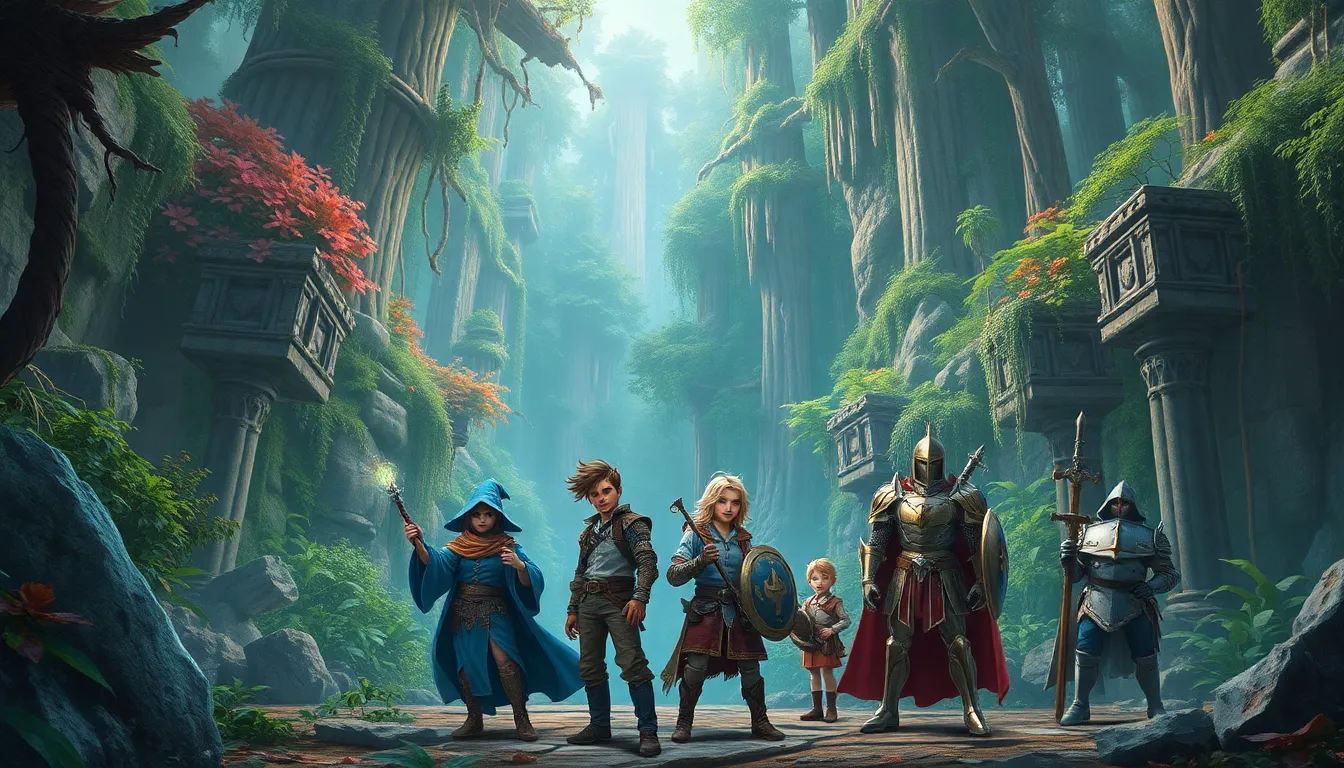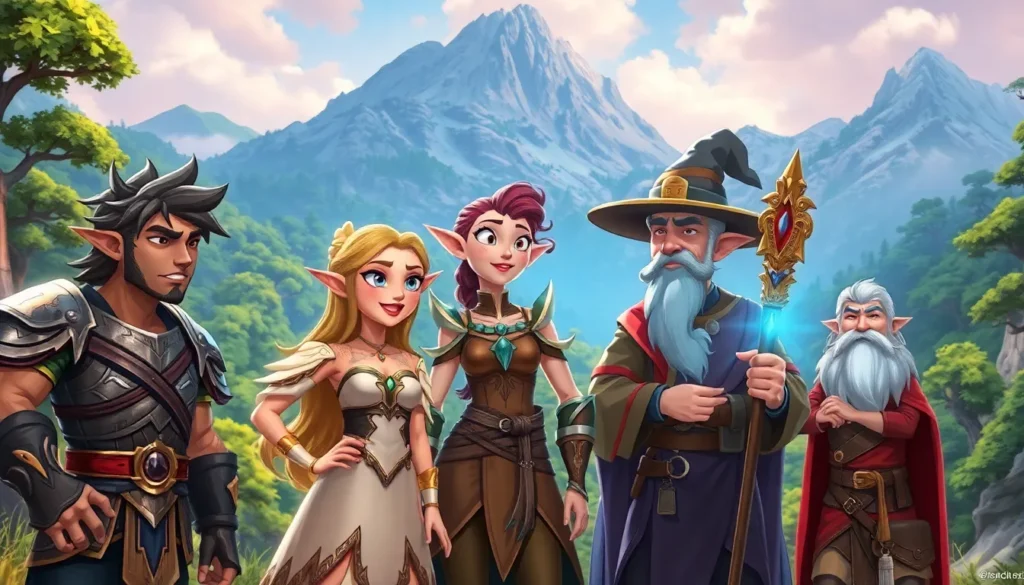Table of Contents
ToggleIn the immersive world of MMORPGs, storytelling takes center stage, captivating players and drawing them into vast, dynamic universes. These games offer more than just combat and exploration; they weave intricate narratives that shape player experiences and foster emotional connections. Whether it’s a battle against dark forces or a quest for lost treasures, the storyline drives engagement and keeps players invested in their characters’ journeys.
As developers craft these rich narratives, they balance player agency with overarching plots, creating a unique blend of freedom and direction. Players often find themselves making choices that influence the outcome of their adventures, leading to a personalized gaming experience. This article delves into the significance of storyline focus in MMORPGs, exploring how compelling narratives enhance gameplay and elevate the genre to new heights.
Importance Of MMORPG Storyline Focus
Storyline focus in MMORPGs enhances player engagement and emotional investment. It shapes the gaming environment, making worlds more vibrant and relatable. Significant narratives create a sense of purpose, guiding players through quests while encouraging exploration and interaction.
- Immersion: Immersive storylines draw players into the game world. Players become emotionally attached to characters, experiencing growth through dynamic narratives.
- Player Choices: Meaningful choices within the story allow players to shape outcomes. This sense of agency enriches the experience, making each quest feel unique.
- Community Building: Shared storytelling fosters community. Players bond over experiences, discussing plot developments and collaborating on quests, which strengthens social ties.
- Replayability: Engaging storylines increase replayability. Different narrative paths encourage players to explore varied experiences, ensuring longevity in gameplay.
- Lore Depth: Detailed lore adds richness to the game. A well-crafted backstory creates a cohesive universe, enhancing player understanding of events and character motivations.
- Motivation: Strong narratives provide motivation for players to progress. Compelling plots often motivate players to complete quests and engage in the game world.
The significance of storyline focus in MMORPGs becomes clear through its ability to enhance immersion and player satisfaction, making storytelling a core component of successful game design.
Elements Of Engaging Storylines

Engaging storylines in MMORPGs consist of critical elements that enhance player experiences. Two key components are character development and world-building.
Character Development
Character development involves creating multi-dimensional characters that resonate with players. Complexity in characters adds depth, allowing players to form emotional connections. Attributes such as backstories, motivations, and flaws help build relatable personas. Characters evolve through player choices, enhancing the investment. Significant character arcs, showcasing growth or decline, captivate players and drive engagement. Relationships and interactions among characters foster a sense of community and belonging, contributing to immersive gameplay.
World-Building
World-building defines the setting where the narrative unfolds. A rich, detailed world includes unique lore, geography, and cultures that captivate players. Consistent rules and histories create a believable environment, inviting exploration. Engaging world-building integrates gameplay mechanics, ensuring that the narrative and the player’s actions are interconnected. Events within the world, such as festivals or conflicts, create a dynamic environment. This immersion deepens emotional investments, prompting players to explore, engage in quests, and become part of the world’s story.
Narrative Techniques In MMORPGs
Narrative techniques play a vital role in MMORPGs, enriching player experiences through engaging quests and meaningful interactions. These techniques enhance both storytelling and gameplay, creating immersive worlds.
Quest Design
Quest design strategically integrates narrative elements to guide players through the game’s storyline. Objectives, such as defeating enemies or collecting items, align with unfolding plots, making players feel integral to the narrative. Progressive quest structures, including main story arcs and side quests, allow for depth and variety. Multi-layered quests can feature branching paths that offer different outcomes based on player choices, enhancing replayability. For instance, players might face a moral decision affecting characters or future quests, fostering personal investment in the storyline. Effective quest design motivates players to explore the game world while deepening their connection to the narrative.
Dialogue Choices
Dialogue choices create interactive storytelling moments that impact gameplay and narrative direction. Players engage with NPCs through various dialogue options, allowing for personalized interactions influenced by character traits or relationships. These choices can lead to different outcomes, affecting alliances, quest availability, or even plot conclusions. Well-crafted dialogue that reflects character personalities enhances immersion. For example, a player might choose empathetic responses, forging stronger bonds with NPCs, or opt for aggressive dialogue that leads to conflict. This dynamic interaction fosters emotional investment, enabling a richer storytelling experience that resonates with players throughout their journey.
Player Agency And Immersion
Player agency plays a crucial role in enhancing immersion in MMORPGs. When players make decisions affecting the storyline, they feel a sense of control over their characters and the game world. Player choices, whether significant or subtle, contribute to a personalized narrative experience.
Dynamic interactions with non-player characters (NPCs) provide opportunities for meaningful decisions. These choices should influence relationship dynamics and potential outcomes. For example, players might face moral dilemmas that lead to unique consequences in questlines or character development.
World-building further enhances immersion. A rich, detailed universe invites exploration and interaction. Varied landscapes, distinct cultures, and evolving lore allow players to lose themselves in the narrative. Engaging with the world reinforces emotional attachment, encouraging players to invest time and effort.
Balancing agency with structured storylines is essential. A core narrative can guide player actions while allowing freedom within the plot’s framework. Effective storytelling gives players a sense of purpose, driving them to pursue quests that resonate emotionally, whether through alliances formed or setbacks faced.
Consequently, immersion increases through shared experiences. Players form communities around their narratives, collaborating on quests and discussing outcomes. This shared storytelling fosters bonds, creating a vibrant social landscape that enhances overall gameplay.
Examples Of Successful MMORPG Storylines
Several MMORPGs have exemplified successful storytelling, creating captivating narratives that resonate with players.
World of Warcraft
World of Warcraft (WoW) provides a rich tapestry of lore, spanning multiple expansions. The ongoing conflict between the Alliance and Horde introduces dynamic narratives that evolve with player actions. Key figures, such as Thrall and Sylvanas, embody significant character development, creating emotional attachments to the storyline.
Final Fantasy XIV
Final Fantasy XIV features an intricate plot that combines personal quests with an overarching storyline. The expansion “Endwalker” skillfully explores themes of sacrifice and rebirth, enhancing player engagement. Players form connections with characters like Alphinaud and Alisaie, whose development drives the narrative forward.
The Elder Scrolls Online
The Elder Scrolls Online integrates familiar lore from The Elder Scrolls series, enriching gameplay with a sense of history. The “Murkmire” expansion invites players to explore the intricate politics and culture of the Argonian people. Choices made throughout quests significantly impact the world, enhancing player agency.
Guild Wars 2
Guild Wars 2 presents a story that evolves based on player choices and seasonal updates. The “Living World” seasons introduce new plotlines, ensuring continual engagement. Characters like Zhaitan and the Elder Dragons create a compelling narrative driven by player actions, allowing for diverse interpretations and outcomes.
Black Desert Online
Black Desert Online showcases a unique approach to storytelling through its open-world environment. The game employs environmental storytelling, letting players piece together lore through exploration. Characters with intricate backgrounds, such as the mysterious Sorceress, enhance immersion and create engaging narratives.
Star Wars: The Old Republic
Star Wars: The Old Republic emphasizes player choice in its storytelling, allowing for different paths within the same overarching narrative. Diverse classes, each with unique storylines tied to the Star Wars universe, create rich narratives. Companions, like T7-01 and Kira Carsen, foster emotional connections and enhance the overall experience.
Storytelling in MMORPGs is a powerful tool that shapes player experiences and fosters emotional connections. Engaging narratives not only enhance immersion but also encourage exploration and interaction within richly constructed worlds. As players navigate through meaningful choices and character developments they become part of a larger story that resonates on a personal level.
The balance between structured plots and player agency creates a dynamic environment where each decision matters. This sense of involvement boosts community engagement as players bond over shared experiences. As the gaming landscape evolves the importance of strong narratives will continue to define the success and longevity of MMORPGs.







